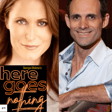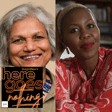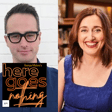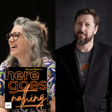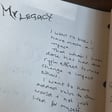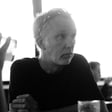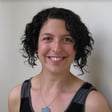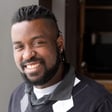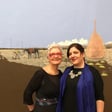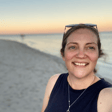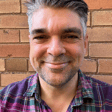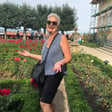Become a Creator today!Start creating today - Share your story with the world!
Start for free
00:00:00
00:00:01

Episode 4: What is it about Jazz? with Mace Francis
Join Mace Francis and I as we discuss his journey into jazz and what is jazz really?
Raised in a creative family in regional Victoria, Dr Mace Francis is the Artistic Director of the Perth International Jazz Festival and previously the Artistic Director of the WA Youth Jazz Orchestra. Mace is a composer and musician and his band, the Mace Francis Orchestra released his 10th Album in 2024.
Mace completed his PhD in 2015 and has undertaken a Churchill Fellowship and was composer in residence at the National Trust's Gallup House.
Music in this episode is from 'No Postcode' by the Mace Francis Orchestra
Transcript
Contemporary Art Challenges
00:00:13
Speaker
Contemporary art forms can often be challenging for the untrained or uninitiated. The attempt to find meaning or narrative can mean disengagement, leading to the refrain, I don't get it.
00:00:25
Speaker
Contemporary visual arts have people saying, I could do that. And contemporary dance performance can at times have people questioning whether they know how to dance at all. Now I am not one of those people.
00:00:38
Speaker
I don't have formal educational training, but rather decades as an audience member, experiencing the new and exciting, challenging art forms and audiences. I love it. And I want people to also know the joy and challenge that this art can bring.
00:00:53
Speaker
Welcome to Here Goes Nothing, a podcast about the arts and how it impacts our lives. I'm your host, Georgia Malone.
Georgia and Mace's Jazz Journey
00:01:02
Speaker
One contemporary art form that I've only recently been getting into in the past few years is jazz.
00:01:07
Speaker
Do I like it? think so. Do I understand it? Mostly no. I think. I'm not sure. Who better to ask these questions than Artistic Director of the Perth International Jazz Festival, Dr. Mace Francis.
00:01:23
Speaker
Mace has been very active in the Perth jazz scene for decades and was for many years the Artistic Director of the WA Youth Jazz Orchestra. He is a composer and a musician and comes from a very creative family.
00:01:37
Speaker
In this episode, Mace and I discuss his creative upbringing and what got him him into jazz in the first place. And also the gift for and an artist to be given time through funding opportunities to create and further his practice.
00:01:51
Speaker
The music in this episode is by the Mace Francis Orchestra, which you can find more of at macefrancis.com. Enjoy.
00:02:02
Speaker
So today we explore music, more specifically jazz. So now music is an art form that is more foreign to me despite having a very many music musicians in my family. So I seem to have inherited my musical skills from my father's side. um So to have this discussion about jazz, I welcome Dr. Mace Francis. Hello, Mace.
00:02:21
Speaker
Hello. Thank you for having me. Thanks for coming. So to kick off, Mace, what is your earliest memory of the arts? The arts, um well, both my parents are visual artists, so kind of every memory um had art in it in some form. So yeah my parents sort of gave up their day jobs as like mum was a nurse and my dad was working in a bank.
00:02:47
Speaker
and when my sister older sister was born. um So by the time I came along, they were yeah full-time artists. Amazing. um And still are. What's their practice? um My mum's a painter and my dad sculpts and they and they do a lot of collaborative projects as well, um you know, public sculpture and art.
00:03:07
Speaker
Yeah, they're always together yeah doing art. um And, yeah, and they have they started off doing pottery and ceramics and stuff because it was the 70s and that was like what you did. But they've done all sorts of things and they've done poetry books and they've done made like little hand-drawn cards and just everything. so And that was in Geelong?
00:03:30
Speaker
yeah Yeah, in Geelong and that sort of they've they've been, they were building a house for about 35 years down on the surf coast. It was like a weekend project. ah So we spent a lot of time down on the Great Ocean Road. Yeah.
00:03:43
Speaker
Driving down to the lawn and Aries Inlet and delivering, you know, paintings and things to and pottery to um galleries and stuff down there. it was the weekend amazing.
00:03:55
Speaker
feeling sick in the back of the combi van, going around the Great Ocean Road, eating licorice and then not eating licorice. And so, yeah, the the house was always always filled with pottery um and filled with paintings. So there's paintings just stacked up.
00:04:12
Speaker
All the walls were covered in paintings and they were stacked up in the hallway. you know, you had to, it was like little animal tracks basically just to get down the hallway. the right kind of hoarding. Yeah, well, they just sort of, they, mum did a lot of painting. Like, she just painted all all the time. her Her workstation was sort of at the end of the dining room table, so we'd be eating dinner and she'd be painting, you know, the smell of turpentine and everything.
00:04:36
Speaker
And oil paint. He explains everything. Yeah, he does. Yeah, so she was always painting and Dad was always out in the garage, you know. Yeah, right. Making things and sculpting and um he's very yeah he's very good with his hands. So, he
Mace's Jazz Education
00:04:52
Speaker
I mean, he built a beautiful mud brick house.
00:04:55
Speaker
Amazing. um All by himself. Wow. Took him 35 years. Yeah, he got there. But he got there and they live there now, very, very happy and out in the bushland in Anglesea.
00:05:06
Speaker
Yeah, right. So, yeah, art has always been the house, always. And how um how did you get into music then? Well, I got into music through my sister, my older sister. um So she she's a sculptor.
00:05:22
Speaker
um so she kind of took that path. But she always dated musicians. or There was a period of time where she dated and and then married um ah guitarist. So there was always and she she was always going to gigs. She loved music, always listening to music. And my she kind of yeah my interest in music came through you know, going to gigs with her, with festivals, going to festivals.
00:05:45
Speaker
um I went to the first Meredith Music Festival when it was like 20 people watching. What year was that? That would have been like 90 – Four? Yeah. 93, 94, something like that.
00:05:56
Speaker
ah Because I was underage, had to hide in the bonnet of her V-dub to get in because I was over 18s only. It's nothing like 90s music festivals. Oh, man, it was so good. The bands were on the back of a truck.
00:06:08
Speaker
Amazing. And, yeah, we'd we go to she'd take me to gigs all the time. We'd go to Melbourne and see all these bands. And then, yeah, her sort of friendship group, there were a lot of guitarists.
00:06:19
Speaker
And then I started playing guitar at high school. And you were getting lessons with these these just bum users, basically. You know love lovely people. know Yeah. And ah and yeah one of them in particular, he was hed liked jazz.
00:06:36
Speaker
um So kind of part of the lessons was sort of like, oh, listen to this. Yeah. Oh, try this. um But I was, you know, learning kind Rolling Stones and Hendrix songs, that sort of yeah seventy s rock which I was into.
00:06:50
Speaker
And, yeah, and just sort of slowly got influenced by that and then watching gigs and, um yeah, just I guess that music, I think because there was a sort of a – i think the appeal was I didn't know what was going on and it kind of sounded cool and there was like, cool people playing it and I'm hanging out with my sister and it was always in, like, cool venues. yeah there was There's an element of cool, which I think a lot of people who are into jazz kind of get drawn. yeah I got into theatre and hung out with University of Romantic Society because my brother did.
00:07:19
Speaker
Yeah, yeah. I just want to hang out with him and his cool mates. Totally. And there was, um yeah, so I kind of got drawn into it and into it that way. Yeah. um And then haven't looked back since.
00:07:31
Speaker
Well, I have looked back a lot, but despite that I keep moving forward. Where did I go wrong? Yeah, exactly. And so jazz, um why did you kind of like then commit kind of to jazz over other music styles? Well, at the beginning I wasn't playing jazz just because it's hard to do.
00:07:47
Speaker
um was playing in, you like punk bands and rock bands and was sort of writing kind rock songs and playing at pubs and things like that. But then there was a TAFE course, a two-year TAFE course that I auditioned for out of high school and was like a contemporary music and jazz course. was like, okay, get a little bit of everything.
00:08:12
Speaker
But the people running the course were like total jazz nerds. So there was no contemporary music. It was just all jazz. Yeah. and And it was really good. that They were really good teachers, a lot of, like, really great theoretical background or, you know, um and starting point, um lots of playing, lots of – they had a lot of ensembles.
00:08:32
Speaker
oh They had, you know, regular concerts we had to play at. um Also, yeah there was, like, arranging classes. It was quite – Thinking back, I mean, it was a very, very good course to get a really good foundation yeah in jazz theory and improvisation.
00:08:50
Speaker
And then the people I was playing in, the year group was really good and we were gigging all the time. yeah like um they still kind of do that sort of stuff at TAFE or it doesn't seem to? Well, I mean, that TAFE course doesn't exist anymore. It sort of finished probably 10 or 15 years ago.
00:09:06
Speaker
the it was really good and it was two years. You could get a lot. done in that two years and learn a lot and get a lot of experience. Yeah. Especially from the amount of playing that we're doing. And then there was there was a pub that opened up called the National Hotel and the people that ran it, there was one person, she'd gone through the TAFE course and so they were booking bands that sort of were jazz related and so people, lot of Melbourne musicians that I was driving to Melbourne to see, they were coming down to Geelong and was just a really good scene and just lots of gigs. Yeah.
00:09:40
Speaker
um I mean, I had two regular gigs a week at that pub. Amazing. Another like two or three regular gigs. but Playing five times a week yeah in Geelong. Is that like the late 90s or early? Yeah. Yeah, yeah. Sort of your 90s, 97 until 2000 when I left.
00:10:00
Speaker
ah It was great. Just like so much playing, cash gigs. Yeah. Oh, God. It was like, um it was amazing. It just got a lot of. yeah playing experience gig experience and then I guess the people that I was hanging out with were jet jazz involved yeah yeah do you think that you know because and there's so many fewer venues now that do live music and have those opportunities do think that just really impacts the those young artists those young musicians kind of coming through that there isn't as much opportunity or yeah or do they just you just find it if you
00:10:34
Speaker
I think you find it.
Challenges for Young Musicians
00:10:34
Speaker
Yeah. um i mean, I was way more motivated to find those gigs than I like am now. Yeah. um You know, going out with, like, demo tapes, like with an actual cassette tape and a little write-up and some photos and, you know, is getting, like, cafe, like, duo and trio gigs.
00:10:54
Speaker
um I think there are all people always find those gigs. I think it's probably harder now. um it just seemed... like venues were a bit more open to it, especially, i mean, I understand from the, like say a cafe or restaurant, they're going to put a duo or trio in, they've probably got to take a table out. Yeah.
00:11:15
Speaker
So you're losing business. Yeah. To put a band in that's costing you money. um mean, it creates a great vibe and it's, that there is worth there, but it's not necessarily easy to see financially. So. Yeah.
00:11:28
Speaker
But I know there was just a really good scene at that time. um But, yeah, I think now with people there's there's like so many good musicians. I mean the coming out of WAPA like every year, so many good musicians and they're just so good. Oh, my God.
00:11:49
Speaker
ah And they're very motivated. And so I think it it would be hard to find gigs these days. Yeah, yeah. Especially if it's something you want to like an original music project. i think that's always been hard. But even just finding like a background music gig somewhere, I think it would be very yeah hard to do these days.
00:12:07
Speaker
And so after that TAFE course, you was WAPA straight after that or? I travelled for a while. Like I went to Italy for three months um and then went to New York for a month and then, yeah, came back and auditioned for WAPA and then, yeah, got into WAPA.
00:12:26
Speaker
They used to do like travelling roadshow auditions so they'd come to Melbourne and Sydney and hold auditions there. And is WAPA as the school, the con there? Is that considered one of the best or is there other options? I think, nationally. mean, at that time was looking the VCA at the time wasn't sort of where I wanted to go musically. It was more kind of improvisation, kind of weirder sort of art music. And so was either the Sydney con WAPA and WAPA.
00:12:58
Speaker
and You had some friends from Geelong who'd come over and they were raving about Whopper and were playing in Wajo and having a great time. And, you know, Perth is further from Geelong than Sydney. So I made the move over there. And it was the first time I moved out home as well. So it was very exciting coming from cold weather to...
00:13:19
Speaker
What, people can live in weather like this all the time? It's so beautiful here. How nice. And then it was like, what, 25 years later, still here. Yeah, well, yeah, the plan was just to study here and then move back to Melbourne like everyone else used to at the time.
00:13:35
Speaker
but yeah Or just move to Melbourne like everyone from Perth needs to do. Yeah, exactly. You've got anything you've got to do it at some stage in your life. um But no, Perth's been very, very kind to me. It's a lovely place, great scene.
00:13:47
Speaker
So the big question though, Mace, what is jazz? What is jazz? but know what say then There's that expression like if you if you have to ask then you'll never know. Yeah, right.
00:13:59
Speaker
I've been thinking about this a little bit recently um and I think it is sort of I guess you k people's connection to guess the culture of the music, or not necessarily like the, you know, the Afro-American o sort of culture but like the actual culture of of the music and like listening to it and sort of immersing yourself in in the actual music. And I think jazz, yeah, I think jazz is sort of, you know, it kind of sounds bit corny, but it's sort of like it's a way of life or it's like ah it's a way of thinking about music. It's a way of approaching music.
00:14:40
Speaker
And I think some people are either born went into it, um other people, you know, immerse themselves or other people think they're doing it but then maybe not doing it.
00:14:53
Speaker
um And I guess the the analogy that I've been thinking about is sort of the the connection, i guess, with like food and like the culture of food. so Italian food, for example, know, people who are are born in Italy, you know, they the history, you know, the the whole family's been born there. like the The food they make is Italian food. Like it's just they can't even – it's just yeah It's just what they do. And that's you know that that might be similar for yeah people who have been brought up in a lineage of family members in New Orleans.
00:15:25
Speaker
saying And it's just the music they play is just it's that is jazz because they've been brought up in the culture of it. Like we had last year the Hot 8 Brass Band were here You know, and they've come from a family of musicians.
00:15:40
Speaker
The music they play is like rooted in like the second line tradition where they play and new New Orleans sort of parade music for funerals yeah and so that's part of it you play them ah slow dige is there um as the um is the fact you know behind the family with with the coffin for a little bit for a couple of blocks and they even talk about the songs as in blocks like and i was like what is a block is it like a like a man of chords and they know like a city block like you walk yeah three blocks you play with that song yeah and then it's party music too yeah sort of that really lively new york fun new orleans stuff so
00:16:17
Speaker
So there's that real cultural, you know, you're you're born there and and that's part of it. and that's And then you might have, know, people who are like second-generation immigrants. know they've so it's You know, it's culturally there but they sort of haven't been brought up in the in the place where it's at. So it's sort of still still there and that might be, know, you have musicians who I guess – you know, have spent some time in the US or, like, so really, like, studied the music at university, you know, like, kind of got a real grasp on it, but it's not really they're not from that place. Yeah.
00:16:55
Speaker
But, you know, some second-generation chefs is, like, almost better in some ways because, you know, they've got they've really researched it and they've really they've got some sort of connection. Yeah.
00:17:08
Speaker
And then that kind of, i guess that goes all the way through to someone who, um like on the very end of it, sort of like, well, I know what a Italian food is. It's pasta and tomato sauce, right? So like SPC canned spaghetti is technically, you know, like it's yeah it's that thing. And, you know, if you've had no connection, if you've had no real connection to Italian food, you might think that's Italian food. But then other people who have had that connection, yeah.
00:17:37
Speaker
And I think it's the same with music as well. There's a lot of people that, you know, think they're playing jazz just because they've got a trumpet in the band and the bass line sort of goes boom, boom, boom, boom.
00:17:50
Speaker
But for people who...
00:17:53
Speaker
who love the music and it it doesn't sound like jazz at all. Yeah. So it's sort of, it's yeah, it's all perspective and it's intention. Yeah, quite of interesting, in especially in Australia with such multicultural and kind of cultural influences in that way and so many generations of whiter australia yeah yeah white Australia as well to try and kind of find the essence of that and to that bring that cultural side of jazz into the music and not just be like – um textbook or academic about it and actually well mean yeah there's mean they're you know in the us of course that's where the music has come it's like they're it's their cultural music and you know there is an argument you know some people have the argument like if you're white you can't play jazz so there's and you know that's um there's that way of thinking um but then you know there's
00:18:43
Speaker
you know, the European tradition where, you know, where a lot of jazz musicians went to Europe because they were treated a lot better back in the, you know, sort of the middle of last century. And so there was that sort people learning from the greats and the sort of that's evolved.
Global Perspectives on Jazz
00:18:58
Speaker
And, you know, there's, you know, you listen to a lot of European jazz and, you know, yeah there's a lot of great stuff there.
00:19:05
Speaker
And I guess there's people in the US s that say that that's not jazz. Mm-hmm. But, you know, looking at it from a different perspective, it's like it really sounds like jazz to me um and it it has all the elements of the things that I really love about It's got the improvisation, to the way it feels, ah like the actual tonal sound of the music, the acousticness of the music.
00:19:29
Speaker
um So, yeah, I think it all comes down to your, your taste um and sort of the how much um your taste basically you know or like your your um the yeah the detail that you have in your taste as well think that kind of yeah using the food analogy people who see food as just food for something for fuel and to keep you going versus they understand the cultural impact and what food means so much more than that and has so many other layers and the importance of it and yeah to actually like
00:20:01
Speaker
want to explore and want to understand yeah yeah the the depth of that rather than just like, oh, that's just something that I do for this purpose. and Yeah, yeah, and, you know, until you've really eat into you've like stayed in a nonna's house and she's like made, you know, like you're eating chicory off the side of the road, you know, a pigeon that she's just killed and it tastes amazing and you're drinking red wine from the the uncle's yeah that he made himself you're pouring it out of an old coke bottle yeah and if you know if you look at you think this is peasant food and it's the best thing you've you know it like tastes amazing because there's all that it's just and how that translates in those cookbooks it's so simple and it's sort of like it's such a simple thing and if you just make it it's just like well that's just a really simple straightforward recipe
00:20:49
Speaker
because you lose all of that kind of the weight of the cultural side of it and where that kind of comes from. And, yeah, and even yeah just, you know, where the food comes from, you know, the the oven that it's cooked in, the wood that they cook with. is there's There's so many things, and I think that that same thing comes...
00:21:04
Speaker
true with the musicians. You know, it's like who they've studied with, what they've listened to, instrument they choose to play, you know, like, you know, the way they practice.
00:21:18
Speaker
um Yeah, there's just so much more to it than just and just playing music that I think is jazz. Yeah. is Yeah, it's yet's the intention and it's the it's it's it's a lifetime worth of information. It's a great analogy and you could do a TED Talk on it.
00:21:33
Speaker
I thought this was what this was. I thought it was interesting as well um from an audience point of view when it comes to, you know, people are so very quick to like, I don't like it. Well, I don't get it.
00:21:43
Speaker
Yeah, yeah. And I find that's the same with other contemporary art forms, contemporary dance, contemporary um visual arts, and it's just that kind of needing to explain or have a narrative or a way of a way of comprehending in a very straightforward traditional way while it just seems to like just let it like Yeah, and why and but why do you have to understand it as well? I think there's lots of types of music that I don't really understand, but, you know, you just let it.
00:22:12
Speaker
It's an experience. You just let it wash over you, and it's it's kind of nice just to focus on something that isn't what you know about and also not thinking about anything else, like all the horrible stuff that's happening in the world right now.
00:22:25
Speaker
say oh When I was at Sydney Dance Company and Rafa, he would always say he'd create works based on an emotion or a word or a feeling, and that kind of would be the starting point. And, you know, at the beginning of a show we'd come out and tell everyone, this is how you watch contemporary dance. You just feel it.
00:22:40
Speaker
It is what it is. Stop trying to explain it. it's there There is no narrative. These are the ideas and the concepts that we started with, but just experience it. Yeah. And it's, yeah, an emotion and and um and appreciate the beauty of it. And, yeah, so I think it's, yeah, challenging. But it is. Yeah. yeah I think, yeah, it's the same. I think people should approach music the same way.
00:23:01
Speaker
I mean, jazz is like a lot of jazz is instrumental. So, you know, there's no even context of lyrics or anything like that. So you can just let it wash over you. You know, does it does it feel good? Do you like you need you like what like the sound of what the bass is doing? you like what the drums, and you know, you can focus on all these different things. And then once you sort of tune in and you sort of like, oh, okay, the drum is, you know,
00:23:28
Speaker
doing stuff with the piano player and then the bass players doing that and then the sax players, you know, responding to you, sort of like the the more you kind of just let it wash over and kind of just focus on the music, you start to pick up on a lot of things. Yeah. And then the sort of the more you get used to that and sort of like, oh, i remember the drummer doing, you know, I've heard a drummer do that thing before. Yeah. And you know, you realise, okay, well, that's like a,
00:23:56
Speaker
thing that you know if a drummer does that the bass player is going to do that sort of like an you know almost in jokes so you kind of the more you get the more that you experience the music and then you listen to recordings like oh yeah that recording in like the 1940s they were doing that and you hear it all the time and even things that you know the instrumentalists play because it is it is just a language and musicians are just putting together phrases and sentences and paragraphs and things that they've heard before or they've practiced or And so you start to kind of get, start to you start to understand it through just experiencing it.
00:24:32
Speaker
um And it's, and yeah, and that's also what I like about the music. is yeah You sort of, um yeah, the more the more you get into it, the more you understand it and then the more you realise you don't understand it and then you get into it more and then it's like, okay, well, I kind of understand that, but now what is going on there? And it's sort of like endless stuff.
00:24:55
Speaker
Yeah. Endless joy and frustration. So there was that great quote that um when David Lynch passed away a few weeks ago, great quote from him saying, why does everyone want art to make sense? Life does not make sense. Right. Yeah, totally.
00:25:07
Speaker
Yeah. well And I think, you know, I think that's what scares a lot of people about jazz because it doesn't, like, make sense. It's like, oh, what is this chaos? and then No one's playing together. It's like, well, they are all playing together. but um And, you know, to the musicians, yeah.
00:25:21
Speaker
Sometimes it makes sense and sometimes it doesn't. um And there's there's just so much excitement in that. and Yeah. And it is different every night as well. So that's also the exciting thing is that you can go see a band multiple times a group of musicians and it's going to sound different.
00:25:34
Speaker
It seems to be like a an art form that... you know, you have those kind of late-night jam sessions that they can just, the musicians get lost in what they're doing, the audiences, and they could just go for hours. And and they sometimes do. Yeah, yeah, It just sort of seems to that the ah those those doing the the work or the the musicians can find so much more in the performances than maybe like if you're performing something that was text-based or scripted and has a lot of time. You have so much more room to kind of move.
00:26:08
Speaker
Yeah, and I think, I mean, some of the criticisms is... You know, it's like it's so self ah self-absorbed and the musicians. And it's like, yeah, it totally is. Yeah. It totally is. And, you know, those jam sessions are great examples where, know, they'll play one song for hours.
00:26:21
Speaker
Yeah. And it's for those situations. It's like, well, that's for the musicians and the ten musicians in the audience. Yeah. um And, you know, there's probably some people there going, what have we just paid come in and see? When are they going to stop?
00:26:34
Speaker
Amazing that there are non-musicians in the room. Yeah, yeah. Not for long. Not for long.
00:26:40
Speaker
They all went to a, I remember going to a house party once. um It was strange and it was like, it turned out to be a listening party. Oh, okay. Some sound art. Yep. In some concrete house. Yep. In North Perth. It was just sound arts kind of where I draw the line, I think.
00:26:56
Speaker
was It was just like, it was like this is amazing just like let's sit watching some guy and twiddle some knobs. Yeah. For hours. Yeah. Well, i mean, yeah, there's, yeah I mean, that's a whole nother, that's kind of taken, you know, where there's, you know, there's there is no melody and there's no chords there's no rhythm. It's just, you just listen to sounds. Yeah. um And that's, yeah, I mean, there is quite a crossover with,
00:27:17
Speaker
jazz and those things as well, I think, with people sort of, you know pushing pushing the boundaries. um You know, there was like a movement in the 60s where they sort of they got rid of chords and they got rid of rhythm and melody, and
00:27:32
Speaker
but it kind of still sort of sounded like jazz. but But then, you know, once electronics and stuff came in, there I think there's there's people that sort of pushed that push that boundary as well until it's just like, what are you listening to?
00:27:46
Speaker
Am I supposed to enjoy this? Yeah, no yeah. No. Is this what we're listening to or is is like the you know the fridge humming? Well, there is that show on RTR, Difficult Listening.
00:28:00
Speaker
so Yeah, yeah. Well, I went to a a sound art conference in Germany. Yeah. And there was a Russian sort of guy and he he's doing his talk and he's on his laptop and you know the speakers are like, and people like sitting there like eyes closed, digging it, and then after about 10 minutes he's like, there's something wrong with the speakers.
00:28:21
Speaker
I was like, oh, my God, that is amazing because I'd listened to other performances where it was that kind of glitch. Yeah. And he that wasn't supposed to be that way.
00:28:33
Speaker
And he's like, he's sweating. and Anyway. You just go with it now. Yeah, yeah. It's like everyone was into it. You could have just not said anything. Yeah. um So you've had a few different musical bands, iterations of your band and things like that.
Mace's Creative Process and Collaborations
00:28:47
Speaker
So the Mace Francis Orchestra seems to be the one that's been 20 years? Yeah, this year. It's exciting. So and and um creating that,
00:28:56
Speaker
the music for that it seems like a really collaborative process with the musicians have you had the same musicians the whole time or is it ah there'sing change there's five musicians in the band that have been there since the beginning yeah uh it's a 14 piece band so there's been lots of you know people move away or don't want to be in the band anymore i think um but yeah that the That band has sort of been a vehicle for my own creativity, which I do sometimes. ah
00:29:27
Speaker
But, yeah, I guess the the initial part, like creating the ideas and putting the music together and is fairly solitary. Like it is me just, you know, sitting alone at a computer and keyboard and yeah guitar and stuff making the music.
00:29:45
Speaker
But then you want once you bring it into a band, then, yeah, that sort of it then comes to life and you realise that bit doesn't work, you know, that bit didn't sound like how I wanted it to sound like when you have, like, actual people playing it or... And then it's sort of working together to add that detail and that, like, the actual music part to the sort of the notes on the paper.
00:30:11
Speaker
Yeah. And, yeah, and the songs have have changed, you know lots of different versions of of things and sort of feature different people or, like, sections have been cut and put back. and Yeah, so that there's there's always a lot of editing and depending on who's playing as well, sometimes, you know, a new member will come into the band, they they bring a different or they bring a different sort attitude or personality to the music and that changes it.
00:30:41
Speaker
um Different people or different periods of the band, we like to play notes longer or like shorter or like all that sort of, it's all the detail that makes the music come to life because the music on the page is, you know, there's detail but it's,
00:30:59
Speaker
It doesn't play itself. Like you you need you need the people to like if you put a staccato mark on a note like that says play it short, well, how short?
00:31:09
Speaker
Yeah. Like that's sort of, you know, there's different there's different shorts yeah they um and there's different longs as well. you You know, we had a rehearsal this morning actually and, and you know, there were just some notes which just didn't I just need them longer these days. I don't want them to be played that short. So, you know, it's how long does the doesn't you know the lead trumpet player feel comfortable playing that note? and You know, there's so there' it's always and that's kind of the fun part of rehearsals and and making music is is when you finally get it to the band and it's that sort of to-ing and fro-ing, way more fun than the actual writing of it.
00:31:49
Speaker
Yeah. The writing of it is just like. Solitary. Yeah, solitary and like the excitement. of the inspiration of a tune disappears very quickly. Yeah. And then it's just like, oh, my God, now I have to actually make this thing.
00:32:03
Speaker
And it's, like, just kind of hard work. Do you kind of, like, set yourself, like, I'm going to do a new album this year and that means I need to do you set aside certain amount of time or is it just when things come to you and you're kind of, like, i'm inspired to be able to put something down? No, never...
00:32:19
Speaker
I have to put deadlines on myself yeah because inspiration are yeah I'm not one of those people like, oh, I've got this amazing idea. you need to write this story. Yeah, yeah, somebody hold my oh my cat. I need to write this.
00:32:31
Speaker
um Yeah, I have to set deadlines for myself. Otherwise, nothing will happen. And that can be, you know, going to organise a gig and I'm going to write two new tunes for that gig. Yeah.
00:32:44
Speaker
And that kind of then motivates me because I'm a person that,
00:32:49
Speaker
I'm very deadline and outcome driven. So if I say I'm going to do it, I have to do it. And it it kind of comes with having a 25-year career as a practising artist. You know, it's not just, you know, wafting through that that time. It's sort of it's a profession.
00:33:07
Speaker
It is yeah taking it seriously. Yeah. you do need to kind of like set yourself those times and those limits and to be able to actually, you know, create because otherwise you could just like fuck around. Well, yeah, and it's, I find, yeah, I find, you know, if you've got a whole weekend to write music, you get nothing done. But it's like, okay, got four hours. Mm-hmm.
00:33:29
Speaker
and I've got to get it done, it's like you get it done. Yeah. And it's, you know, and you kind of the older you get, you have more, you know, other responsibilities and other things in in your life and you just have to have to make that time.
00:33:43
Speaker
Yeah. Because if you don't, then you don't do the thing that you think you do. Yeah. Or you tell people. It's like, yeah, I'm a composer. I was like, oh, when was the last time you wrote something?
00:33:55
Speaker
Oh, 1990. Yeah.
00:33:59
Speaker
But, yeah. They're not actually composing. yeah, no. No. They're more of the posing than the composing, yeah. And so you had also had roles at the Perth International Jazz Festival and WHA Youth Jazz Orchestra around and there's a lot of programming yeah in those roles.
00:34:16
Speaker
What's that kind of, how do you find that, like, as far as from a creative creativity point of view, creative outlet, like putting programs together and thinking that that kind of process through? Well, yeah, I'd,
00:34:29
Speaker
when I started doing those things, I didn't realise how much I enjoyed making things. Like I really enjoyed making, know, before that, you know, making songs, compositions, ah making a band.
00:34:44
Speaker
But then it was like, oh, yeah, well, I really enjoy like organising tours, like so making a tour and then yeah like making a programme, you know, kind of problem problem solving, trying to like make it work with the budget that you have and like all all those things. It's sort of there's,
00:35:00
Speaker
yeah I think there's a creativity to that because it's very easy to say, oh, that's not going to work because because of these reasons. It's like, oh, watch me. And, yeah, those those roles um I think, yeah, kind of fuel that that's sort of urge to to make things and to, like, make things.
00:35:20
Speaker
Yeah, make things that are new and and different but then also that people like. you know that's also You know, there's always ego involved and, you know, even with the music that I write, it's like this this music's for me but I really hope other people like it. Yeah.
00:35:37
Speaker
And, yeah, it's the same with, you know the programs with Wageo and with the Jazz Festival. it's Yeah. It's trying to, yeah, balance those things. It's not just purely like I'm going to write pop music for the masses and I'm not going to do programs where it's just, you know. Who's on the books and who's touring right now? Yeah, yeah. Put them there. Like, yeah, I really like, especially at the Jazz Festival now, like presenting people, artists that are kind of, you know, on the rise, like you kind of sense they're going to be like really expensive in five years' time, but getting them.
00:36:09
Speaker
Get it first, yeah. Yeah, yeah, but like introducing them to audiences. um There was someone, there was an artist last year, Sarah Hanahan from New York, who's just, incredible And, you know, of course no one's heard of her, so, it's you know, it's a hard sell. But the people that were in the audience that night were blown away. Yeah. And the way she worked with the local band, you know, I've never heard Ben VanderWaal, the drummer, who was like yeah he just played with ah ne like the energy and it was just that she kind of bought out of him.
00:36:38
Speaker
And so, you know, it was a really amazing, special, special moment. I was able to make yeah that that thing happen. And it only happened for the first time in Perth perse that night.
00:36:50
Speaker
Amazing. And it was like really, it was another beautiful moment with a trombone player from New York. I paired them. I'd been doing this series called Nice to Meet You. kind of put these two musicians together that have never met before, never played together, sometimes not even ever spoken to each other via email or anything. Yeah.
00:37:10
Speaker
And they talk about what they're going to play and they get on stage and they play for the first time together in front of an audience. And this, you know, young mid-20s trombone player from New York and she was teamed up with Ray Walker who's like, you know, in his, what I think he's just turned 80 or something.
00:37:30
Speaker
he just recently one of the state treasures? Yes, he's a state treasure. He wasn't a state treasure at that time but he was not. could afford him then. yeah um And just put them together and they just made the most beautiful, amazing beautiful music together.
00:37:43
Speaker
um And it's so those those are things that you don't, you can't predict, you know, you can't make happen. You can't just say um when you're putting the program together that these are going to be these moments where that drummer is going to yeah yeah be able to like, you know, enhance his have the best time he's ever had or, yeah you know, it's sort of, it comes, you have a hope, an inkling, and that's where the skill of being doing it for so long You can kind of find those people that can give those moments but then to create those actual.
00:38:10
Speaker
Yeah, yeah. It's become spontaneous. Yeah, it's a calculated risk because you don't, Yeah, when I first heard Mario, the trombone player, play, she's very into like the old school music and, know, just the way she was playing, I thought the first time I heard it, I was like, love to hear her play with Ray. Like because, you know, he's from the older generation. this beautiful guitar sound.
00:38:36
Speaker
He's got a great time feel. He's just, yeah, so, so great. um And so i ah knew it was going to work. i mean, I didn't know it was to work, but I knew it was going to work.
00:38:47
Speaker
And, yeah, just... Just, yeah, just watching that moment was like, oh, my God, this is yeah amazing. Like just amazing. They'd just talk together in the green room just beforehand. Fantastic. They'd pick some songs.
00:39:00
Speaker
Do you know this song? Oh, you know that's oh yeah, I know that song. Oh, yeah, I do know that song. And they'd get out and it's like they'd been playing together for decades. Amazing. And yeah I think there's that's the beauty of jazz as well. like just there's ah There's a repertoire of songs that everyone should know and there's sort of a,
00:39:19
Speaker
Yeah, it is that it's it's conversation in in the music, the improvisation. You're listening, you're accompanying, you you're offering something and then someone replies and there's just it's not like I sing my lyrics and that's it and I've got my bass line and that's all I play. Like anything can happen. Yeah.
00:39:36
Speaker
And, you know, if mistakes happen, that's just all part of the joy of it well. And it just happens in that moment and it will never happen again. Oh, it's just like so magic, so magic. That's so great.
00:39:48
Speaker
and Yeah. So do you have, you know, it's been a big career, so what's some kind of life-changing moments for you? Some life-changing moments. um Well, I think, yeah, the first first time I heard, i was yeah living with some housemates at uni and was, yeah, my first year at university and I'd come over to study guitar and they played some of these, like, beautiful contemporary big band music that I'd never heard by composer Bob Brookmeyer.
00:40:20
Speaker
um And I'd never heard anything like it. And I was like, what is this, like an orchestra, like classical orchestra? And it's oh, no, it's like a jazz big band. But the way ah Yeah, he'd orchestrate the you know orchestrate the band. It was like flutes and clarinets instead of saxophones and ah just just beautiful contemporary writing and just that completely changed my trajectory. i was going to be, you know, jazz guitarist and just do guitar things. Yeah.
00:40:51
Speaker
And then almost from that moment on kind of haven't really played guitar that much anymore yeah and have just – focused and and loved jazz orchestras and big bands.
00:41:02
Speaker
So there was like a real, why have I never heard this before? Like have where, is this is this a new recording? It's like, oh, yeah, from like the 80s. um So, yeah, that was a real life-changing moment. Yeah.
00:41:17
Speaker
which then, you know, led me to like, well, I'm going audition for Wajo and kind of get into the big band thing there and then being in Wajo and then being too old for Wajo, you know, turning 25. I started my own band. Yeah.
00:41:29
Speaker
And then that's been, you know, 20 years. Yeah. and You know, 10 albums and lots of tours and stuff. And then, you know with that band organising events and like,
00:41:41
Speaker
tours and and those sorts of things and then getting into more event stuff and then ending up with the jazz festival and then yeah so it's sort of yeah starting off the music journey thinking you're doing one thing and then ending up like in a completely different place and kind of loving every moment Like every turn. Yeah.
00:41:59
Speaker
It's like, okay, this is amazing. I know. kind of, my career was sort of the same. Like I did a show, like um producing a show at the Rackabites in 2001 and I was the producer and we had a publicist.
00:42:12
Speaker
Didn't go great. So I took over the publicity and went, oh, this is fun. I can do marketing publicity. And then then year later I applied for job as marketing assistant at the Perth Festival and then And I was 23 and got in there and then that just one thing led to another and led to another.
00:42:26
Speaker
And then later on when I came back to Perth, Sydney in 2015, sort of someone said, do you want to go work at TEDx Perth? And I'm like, I'll do the gentleman. and from there I got then event producing and got opportunities and it just rolled on and it kind of then led to a company that I ran for five years. It just sort of one thing after another. It wasn't kind of a traditional career process program or whatever. It just kind of just kept going and accumulating. And I think, yeah, I think that's the exciting and stressful thing about about the arts is that you you enter it sort
00:43:02
Speaker
And because there is no regular thing, you're not like tied to a ah desk and you haven't like, oh, well, I can't do that other thing because I do this thing every day. Yeah, and just even calling yourself a producer, it's like, what does that even mean?
00:43:15
Speaker
It can mean so many things. Totally. And it just sort of, there's a creative producer, an event producer, or just like a, you know. Film producer. Film producer. Straight up doing anything. Just do budgets your entire life.
00:43:28
Speaker
um Yeah. Yeah. So much more interesting. And I kind of think, yeah, not necessarily ever had a creative practice of my own, but there's been a creative way of approaching life, I think. Oh, yeah. No, I think, yeah, you definitely, yeah, you've been very creative, all those things. Like they those things wouldn't have happened if you didn't have a creative brain.
00:43:49
Speaker
Yeah. Yeah. It just... mean, we worked together at the jazz festival. The jazz festival when there was no money. You were very creative. You know, that grey area, everyone's like, we need to know what's in that grey area. was like, that grey area is where Georgia makes the festival happen.
00:44:05
Speaker
It's like, don't dig into that grey area. I know I often think in meetings and just like have this real, you know, people ask me my experience my opinion on something and I kind of give it very freely and very quickly yes and think oh that was my instinct says these things and I'm right most of the time yeah and you know um and everyone's always like oh i need to think about it and it's like trust me i'm right and then i'm right and then it's like well that but that doesn't come from just being blase that comes from 25 years of doing this yeah and knowing what works and what doesn't work yes you know you do a campaign you've done yeah you've done all the things from like total failure all the way through to like yeah success and it's like yeah i know and i know where we know where it's gonna and i can see what's gonna happen if we continue on this path so
00:44:51
Speaker
Yeah. Yeah, i remember those conversations. Are you sure you wanted? What a time that was. Oh, my God. um So you've had a couple of other opportunities to further it, like explore your practice. so You've got a PhD through WAPA and you also recently did a Churchill Fellowship.
00:45:07
Speaker
and How do you how do you important do see having that time to just really focus um on your practice and what you're doing and kind of have a real targeted thing that you're focused on?
00:45:19
Speaker
Yeah, the really important. um um yeah I was lucky to have ah one of the, um churchbo not Churchill, the Gallup House Composer and Residence House, which is a 12-month house that you get to live in rent-free and um just focus on your art as well.
00:45:35
Speaker
and And from that, you lots of albums and compositions and stuff happened, you know, within that time period but also later on, you know, you because, yeah, it's amazing how much like the rent stresses you out and because we're always stressed. It's either the rent or the mortgage. you know you It's just such a huge part of your existence.
00:45:59
Speaker
And to not have to worry about that for a year was incredible because you you get to choose the things that you decide to do So his artwork is valued as real work.
00:46:11
Speaker
Yeah, totally. Amazing. Totally, yeah. So that Gallop House residency was amazing for that. The PhD was was um very intense. ah It's not for everyone.
00:46:24
Speaker
um But, yeah, that that was like, a you know, to have that time where you sort of just focus on something very narrow for a long period of time um is valuable in,
00:46:39
Speaker
and kind of learning this, like, think was more valuable with the research skills than necessarily the the outcome of the, you know, it's like no one's ever going to read it. um But, yeah, you kind of, you know, you you learn, like, you know, kind of deeper research skills and how to motivate yourself to get that thing done. Yeah. Because there's no one really telling you you have to do it, but you do have to get it done. Yeah. um And you're all by yourself and no one knows what you're doing and no one's really interested in the topic that you're doing because that's because no one else has done it so that's why you're doing it because there's this gap in the in the knowledge yeah um so yeah there was that was a very intense time but yeah the skills of being able to just like bunker down focus because uh yeah i mean i get very easily distracted um
00:47:33
Speaker
i I wasn't like learn how to read quite late. You know, my mum's like, can you read that? You know, I was very good at avoiding, you know, we didn't have some great, there was a primary school teacher that, you know, didn't really teach us how to read.
00:47:48
Speaker
Yeah. um And so you kind of always struggled with with reading a little bit. So like just reading like endless journals and was sort of like I learned a lot of skills there and like yeah reading things and like comprehending it and like understanding. It was like, oh, my God, I'm not, it I mean, it,
00:48:05
Speaker
It took me a lot longer than I probably took other people to do, but it was really good to do. was sort of like a you know, like a bridging course. yeah I should have already known all that stuff. um But, yeah, that focused time and where, yeah, you you're not doing anything else.
00:48:25
Speaker
um I mean, you're doing other things, but, yeah, you sort of have to reduce down you need the amount of work that you're doing if you're on a scholarship and stuff like that. So... um And then the Churchill was amazing because, again, it just gave you that freedom to be able to not well not worry about the money side of things. So it's like there's really good thing in Munich tonight.
00:48:47
Speaker
It's going to cost, you know, $500 return on the train, you know, so I can do it. Yeah. And go and it's like I'm so glad I went. I met all these people. i was like if you're kind of like, oh, if I do that tonight, then I can't do anything next week. and Yeah.
00:49:05
Speaker
um So, yeah, just sort of having that kind of that buffer, either either time or or money, um just yeah, really really helps just to be out of take the opportunities when they happen and just focus in on them.
00:49:21
Speaker
They're not sort of like, oh, well if I do that, then I've got to do that because I've got to pay that paid the bill to do that thing. And, um yeah, so, yeah, those opportunities have been amazing.
00:49:32
Speaker
um Yeah, the yeah like the flexibility of ah time and being able to take opportunities when they arise. Yeah. It's so important to kind of, I think, for artists to, yeah, take that pressure off from a money standpoint money point of view to be able to have the space to be creative and space to do what you do um and to be valued you know yeah well yeah yeah exactly yeah it's not like because you have those opportunities you're not just given the time and no financial way of yeah dealing with anything it's like oh you've got no work and you've got all the time as well to yeah to do nothing gives you can't afford to do anything no yes an opportunity doesn't necessarily pay the rent but when yeah you know there's stuff that
00:50:14
Speaker
Can pay your rent. Well, and and, you know, the the planning for the Churchill was, like, really stressful because, know, people weren't getting back to me and, you know, like I'm trying to organise meeting in this country and then a meeting here on and then, you know, with someone else and different country people aren't responding and and then getting there and realising, they're all people like me yeah who are just, like, you know, stressed with their job and, you know, un- in an organization which is under-resourced and, you know, they're doing too much.
Impact of International Collaborations
00:50:47
Speaker
and
00:50:48
Speaker
But then when you do catch up with someone, it's like connecting with an old friend. its like It was amazing. All the people I met were sort ah went sort of all similar in some way. Very passionate about something, kind of you're little bit crazy to persist for so long at something that isn't, you know, that has some successes and not, you know. like Yeah.
00:51:09
Speaker
and just connecting with those people. And then those opportunities, you've got to meet so-and-so, let's, you know, let's, ah we can go for a drink now. They're off, you know. Yeah. And I think it's sort of, yeah, you, like, from,
00:51:20
Speaker
that that but opportunity like church was funding that sort of thing that small amount of support then just creates collaboration collects you know it makes it like the feelers go out it creates so much more than just like if you pay for you know this work to be put on that stage you're actually yeah impacting the cultural landscape and the ecology of Australia and internationally as well because then bringing that back into Perth and what influence that will have at the Jazz Festival yeah and the the the artists here are based here as well. And it's, you know, the and it comes down to meeting people.
00:51:53
Speaker
I mean, you know, there was people I met and, you know, we finally met and they're like, oh, you're ah you're that email. but yeah They're like, yeah, that was so... Random. So random. And they're like, we weren't sure if it was, you know, I'm really glad you persisted. i was like, oh, thanks. Which one was real, so I didn't reply. yeah, um but you' meeting those people and then, you know, I mean, things, you there might be some things happening this year and in Europe because of those connections, but then I i just know that there's it's just things happen over time. Yeah.
00:52:25
Speaker
You know, when when i then, contact that person, they know who I am yeah It's not like that random email out of the blue and ah and, you know, just meeting, you know, artists and agents and managers and all that sort of stuff, especially for the jazz festival. It's like and then you've met each other, you know each other's personalities, you can kind of cut through the formalities of an email or like or you can pick up the phone and you kind of know how that person operates, the way they think, yeah you know, sort of.
00:52:55
Speaker
easier to negotiate know if you know if the person is you know that they're willing to negotiate and they're easy to deal with other people you meet and go okay well we might not we can stop this relationship now you know it goes both ways yeah but yeah those that's just opportunities to just get out and about and meet people that's so great opportunities it was it was amazing yeah and so just a complete diversion we've had a conversation recently um about the role the arts plays for young people and children especially and you've got a three-year-old so kind of watching her um engage with music and what you do um
00:53:33
Speaker
Yeah, just kind of how important it is to have for her to have, you know, access to that kind of stuff. and Yeah, well, she really um loves music. And it's not because I'm like, you've got to practice your piano.
00:53:48
Speaker
um Just because we listen to music around the house, um it's, yeah, incredible. ah She loves telling people, my dad plays music with his friends and makes people happy.
00:54:00
Speaker
And it's just like, oh, my God, it's like that's so beautiful. That's so lovely. And I wish I did more of that. Yeah. um But, yeah, just, you know, her, you know, just singing and dancing, you know, just her just sitting there just talking to herself, just making up songs.
00:54:17
Speaker
I mean, what a great way to... kind of experience the world and I guess, you know, all the things that she's learning and going on in her head and she's just like singing about it, making up these beautiful little melodies and then, you know, banging on them. She's got a harmonica, you know, yeah she's got the blues and just movement as well. Like she sort of, you know, dances around really a and yeah, kind of expresses herself through dance. Like actually, you know, if something's,
00:54:49
Speaker
You're not going to see this on the podcast, but, you know, if something's very delicate, you know, she's talking to one of her toys and she's very gentle and moving and then other times she's very expressive and and sort of,
00:55:02
Speaker
raises a voice and sings and will express that through movement yeah oh my god this is amazing amazing yeah and just just to encourage that and they're like hey stop making noise yeah you know like stop you know you know yeah and she you know she does it in in public all the time and great you can hear her you know if you go to the supermarket you can hear her But I think, you know, what a great way to yeah just go through life expressing yourself and just feeling. It's important to continue to encourage that as they get older and get into the school system and things like that. Yeah, yeah, totally. Because I know, I mean, I wish I had more freedom to be able to just, like, sing.
00:55:40
Speaker
But it's so it's almost like a blockage. youre like You don't want to make noise. You don't want to embarrass yourself. You don't want to sound stupid or anything. But it doesn't, she doesn't care. Yeah. She just goes for it and sings. I do. And it's just like just to, I think that would, yeah, because I'm, you know, I'm not great at expressing my emotions in certain ways.
00:55:59
Speaker
um So just being, just having her to be able to do that through different art forms. Yeah. And like through drawing, painting, ah yeah, singing, dancing, movement.
00:56:11
Speaker
It's just so, good. And to be doing it that that age and just like hopefully just maintain it maintain it just like don't don't let the turkeys get you down basically yeah yeah fantastic well thank you so much maize for joining me for here goes nothing it's uh um you know great to be able to have conversations about areas that i don't necessarily know that much about um you know happy to admit that i don't know everything ah or okay guys it's recorded as well
00:56:43
Speaker
You can edit that out. Yeah, exactly. I'm the editor too, man. Cool. Well, thank you. Well, thanks. Thanks for having me. No worries.
00:57:05
Speaker
Thank you again my guest, Mace. Always fun to chat. Make sure you find time to seek out and connect with jazz music in your local area. It's really important to support these young artists as they create new work.
00:57:17
Speaker
As always, you can find links to everything discussed on my substat here goes nothingpod dot substack, and you can find all of Mace's projects, including the Mace Francis Orchestra, at macefrancis.com.
Teaser for Next Episode
00:57:30
Speaker
Next week, we delve into a genre of fiction that my next guest describes as a gateway drug. It's feminist sci-fi and hardcore sci-fi, otherwise known space operas.
00:57:41
Speaker
Join Jane Cleave and I as we find the connections and humanity in a sometimes maligned art form. Till then. This podcast was made on Wojak Noongar Budja, a place I'm very privileged to call my home.
00:57:55
Speaker
And I acknowledge and honour all Noongar people that have been making art on this land for tens of thousands of years and will continue to do so for generations to come. Always was, always will be Aboriginal land.
00:58:07
Speaker
This is a GM Productions Project.
00:58:24
Speaker
you
